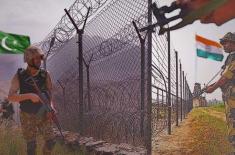
India's Aggressive Designs Push South Asia Into Brink Of War
Fahad Shabbir (@FahadShabbir) Published May 08, 2025 | 08:40 PM

The recent unprovoked India's missiles and drones assaults mainly on civilan population in Pakistan and Azad Kashmir have been widely condemned in Khyber Pakhtunkhwa where security experts termed of pushing the South Asia into a brink of full fledge war
PESHAWAR, (UrduPoint / Pakistan Point News - 8th May, 2025) The recent unprovoked India's missiles and drones assaults mainly on civilan population in Pakistan and Azad Kashmir have been widely condemned in Khyber Pakhtunkhwa where security experts termed of pushing the South Asia into a brink of full fledge war.
The latest drones aggression by the India signals a continuation of its longstanding hostile and provocative designs toward its western neighbour—a pattern that has brought the subcontinent perilously close to full-scale war.
The latest escalation began when Indian warplanes, including Rafale jets, have launched missile strikes mainly on civilian targets in Bahawalpur, Muridke, Kotli, Muzaffarabad etc, martyring civilians including children and women besides injuring dozens others.
The blatant missle attack under cover of darkness was a sheer violations of inter state relations, UN charter and international law.
In a swift and decisive response against India's blatant aggression, the Pakistan Air Force (PAF) shot down five Indian aircraft, including three Rafale fighter jets and inflicted heavy losses to the enemy.
PAF have also neutralized several Indian drones that were reportedly launched soon after the aerial assault in several places of Punjab and Karachi to create fear and panic among people.
"India’s cowardly attack under the cover of darkness is a blatant violation of international law, UN charter and it has once again shown India's disregard for regional peace and human life," said Brigadier (R) Mahmood Shah, former Secretary Law and Order of the erstwhile Federally Administered Tribal Areas (FATA).
"The downing of Indian five warplanes is a testament to the high professionalism and readiness of the Pakistan Air Force," he said, adding PAF has raised the nation's head high.
According to security sources, India has launched Israeli-made Harop drones into Pakistani territory of Punjab and Karachi after India suffered colossal losses.
In response, Pakistan’s air defense units have successfully intercepted and destroyed 25 of these drones using both electronic and kinetic countermeasures.
The recovered drone debris, found across multiple regions in Pakistan, is being examined for further intelligence.
Brigadier Mahmood Shah believed the use of such drones underlines India’s increasing desperation and panic following significant losses along the Line of Control (LoC) and destruction of their expansive warplanes.
The recent developments have reignited debate over the unresolved Kashmir issue—a historical flashpoint that has led to multiple wars between the two nuclear-armed neighbors.
Both these countries have fought wars in 1947–48, 1965, 1971, and 1999 on Kashmir after India had illegally invaded in October 1947.
Brigadier Shah emphasized that Pakistan, as a responsible nuclear power, has demonstrated "maximum restraint" despite repeated provocations by the Indian forces.
“Our desire for peace must not be mistaken for weakness,” he warned, urging the United Nations Security Council to enforce its long-standing resolutions on Kashmir.
"The road to lasting peace in South Asia passes through Kashmir," Shah stated and added that four wars were already fought on this lingering dispute and another war on it would bring disaster for the entire region.
“It is imperative that the international community holds India accountable for the recent misadventure and prevents the situation from spiraling into a full-scale nuclear war.”
As Pakistan maintain high alert along the LoC and beyond, the international community watches with growing concern the Indian unprovoked aggression.
He said the coming days will prove critical for regional peace and stability as diplomatic channels work behind the scenes to de-escalate the situation.
Recent Stories

Rawalpindi BISE exams scheduled for May 9 cancelled

IHC removes objections on petitions of PTI founder, Bushra Bibi

Mango farmers advised for timely irrigation of orchards

JKNF calls for defusing tensions & resolving Kashmir issue

Pakistan's total liquid foreign reserves $ 15.48 billion

India's aggressive designs push South Asia into brink of war

UNICEF team meets KP Health Adviser

Ministry committed to strengthening agriculture for a green Pakistan: Minister o ..

Islamabad's CDA Hospital performs Pakistan's first robotic bariatric surgery

Pakistan must reckon hidden costs of coal power: Experts

FCCI President, Commerce Minister discusses tariff Reforms export facilitation

Dera police arrest criminal in theft cases
More Stories From Pakistan
-

IHC removes objections on petitions of PTI founder, Bushra Bibi
3 seconds ago -

Mango farmers advised for timely irrigation of orchards
4 seconds ago -

India's aggressive designs push South Asia into brink of war
6 minutes ago -

UNICEF team meets KP Health Adviser
6 minutes ago -

Pakistan must reckon hidden costs of coal power: Experts
6 minutes ago -

Dera police arrest criminal in theft cases
3 minutes ago
-

Commissioner urges public not to pay heed to rumours
3 minutes ago -

AC Lalian cracks down on illegally operated petrol agency & pump
3 minutes ago -

Indian aggression: IG Punjab orders to beef-up security across province
3 minutes ago -

ACS South Punjab visits livestock farm in Cholistan
10 minutes ago -

Mock exercise to deal with emergency situations held at Murree
10 minutes ago -

Proposal for establishing KP languages academy supported
10 minutes ago











